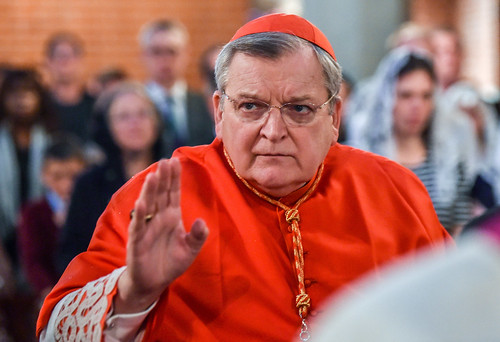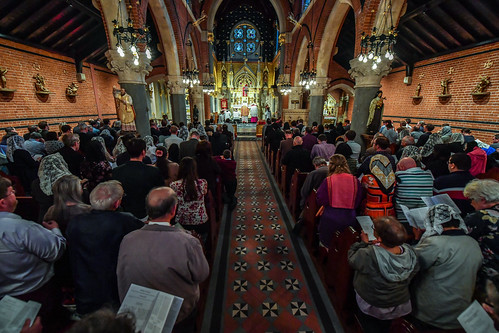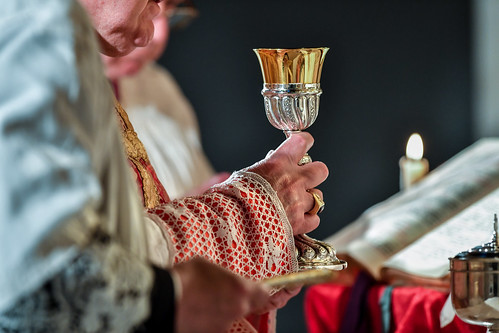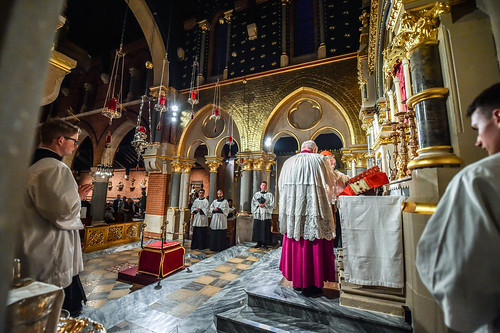Chairman's Blog
LMS Aylesford Pilgrimage, 26th October
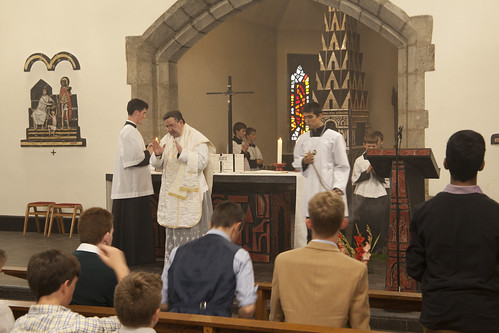 |
| The St Catherine's Trust Summer School at Aylesford in July |
Saturday 26th October will see the Latin Mass Society's annul pilgrimage to the Carmelite Priory at Aylesford, home of the Brown Scapular. We have Mass in the Relic Chapel, which houses the cranium of St Simon Stock, the recipient of the promises of Our Lady on the scapular.
1:30 pm – Missa Cantata (Votive Mass of the Blessed Virgin Mary) (Fr Matthew Goddard FSSP)
Sung by Schola Cantorum Sancti Johannes Houghton (Director: Clifford Lister)
3:00 pm – The Rosary Way (led by Fr Matthew Goddard FSSP)
3:45 pm – Enrolment in the Brown Scapular (administer by Fr Matthew Goddard FSSP)
4:15 pm – Vespers (Little Office of Our Lady) and Benediction (Fr Matthew Goddard FSSP)
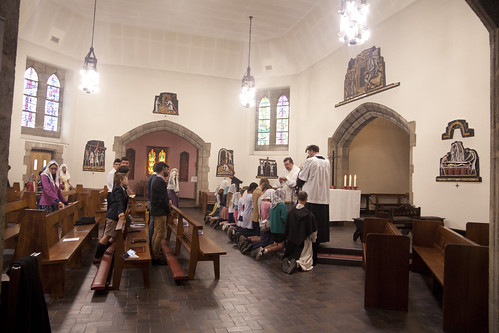 |
| Enrollment in the Brown Scapular in the Relic Chapel |
Support the Latin Mass Society
Good Counsel Network: annual ball
Sir James MacMillan: London performances
 Sir James MacMillan is a Patron of the Latin Mass Society, and I am pleased to pass on this notice about a forthcoming performance of his work, from the man himself.
Sir James MacMillan is a Patron of the Latin Mass Society, and I am pleased to pass on this notice about a forthcoming performance of his work, from the man himself.-----
Le grand Inconnu is coming to London on 14 October. (The BBC Radio 3 broadcast of the premiere is below.)
'Breaking with the Pope'
 Perhaps I can help him out. Like Condon, I believe that Jorge Bergoglio was validly elected as pope and reigns today, as a matter of the law of the Church, as Pope Francis. Also like Condon, who has written extensively and often very well on recent crises in the Church, I have some concerns about some of the things which Pope Francis has done and said. Perhaps he and I also agree that it would be good if Pope Francis were to clarify some of his more puzzling remarks, even if Condon prefers not to clarify his own.
Perhaps I can help him out. Like Condon, I believe that Jorge Bergoglio was validly elected as pope and reigns today, as a matter of the law of the Church, as Pope Francis. Also like Condon, who has written extensively and often very well on recent crises in the Church, I have some concerns about some of the things which Pope Francis has done and said. Perhaps he and I also agree that it would be good if Pope Francis were to clarify some of his more puzzling remarks, even if Condon prefers not to clarify his own. Support the Latin Mass Society
Cardinal Burke in London: photos
His Eminence Raymond, Cardinal Burke, celebrated Low Mass in the Shrine Church of Corpus Christi on Monday 16th September, at the request of the Latin Mass Society. We were very honoured by his kindness in doing this, which is very characteristic of him.
This church is one of London's historic Catholic churches, and has a special place in the history of the Traditional Mass, as thanks to various parish priests over the years the celebration of the ancient Mass never ceased here. Today it is, of longstanding custom, celebrated every Monday evening, a Mass organised by the Latin Mass Society, and on some other occasions as well. Cardinal Burke was a very special celebrant, therefore, for this regular Mass, which is usualy a Missa Cantata.
The Shrine Custodian and Parish Priest, Fr Alan Robinson, very generously assisted us in preparing for this Mass in his church, which took place also with the knowledge and good will of His Eminence Vincent, Cardinal Nichols, Archbishop of Westminster. We are very grateful to all those who made this Mass possible.
The church was absolutely packed, with about 300 people. Cardinal Burke had previously been to Glasgow and had celebrated Mass there for the anniversary of Summorum Pontificum. He subsequently addressed the Confraternity of Catholic Clergy in London.
The Mass was Low, celebrated in a solemn form, and accompanied by some lovely music by Elgar, Franck and Palestrina, sung by Cantus Magnus under the direction of Matthew Schellhorn.
His Eminence was assisted by two Chaplains of Honour, Mgr Gordon Read and Fr Rupert McHardy of the London Oratory. The Master of Ceremonies was Mr Richard Picket. We had a very well-prepared serving team, which included many of those who serve regularly for the Monday Masses in Corpus Christi. These photographs were taken by a professional photographer, John Aron.
Reminder: Server training in London this Saturday
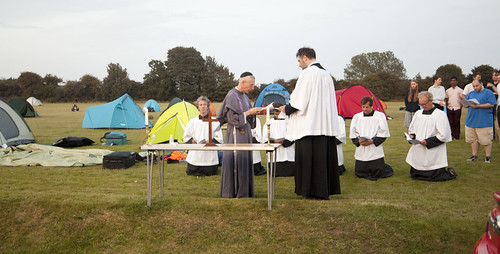 |
| Enrollmemts into the Society of St Tarcisius on the Walsingham Pilgrimage |
The training days for Altar servers have been a great success, regularly attracting a dozen participants. The servers' sodality we have established, the Society of St Tarcisius, now has 59 enrolled members, from as far away as Bristol and Edinburgh.
In the London events, the Guild of St Clare has a vestment-mending day running alongside the server training, making use (at St Mary Moorfield's) of the large and well-appointed basement.
The next two events, on this Saturday, one next month, are both in St Mary Moorfields, 4-5 Eldon St, London EC2M 7LS (click for a map):
Saturday 14th September (booking page here)
Saturday 30th November (booking page here).
Please book for the server training; if you wish to participate in the vestment mending, email the Guild of St Clare. (It really helps to know how many people are coming!)
Gender theory is ruining theatre
Support the Latin Mass Society
Eucharistic Adoration is not the answer to the crisis of faith in the Real Presence
Paganism old and new
My latest on LifeSiteNews.
Cardinal Pell and contempt for justice
My latest on LifeSiteNews.
---

